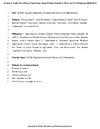Please use this identifier to cite or link to this item:
https://accedacris.ulpgc.es/jspui/handle/10553/41390
| Title: | CLOCK regulates mammary epithelial cell growth and differentiation | Authors: | Casey, Theresa Crodian, Jennifer Suarez-Trujillo, Aridany Erickson, Emily Weldon, Bethany Crow, Kristi Cummings, Shelby Chen, Yulu Shamay, Avi Mabjeesh, Sameer J. Plaut, Karen |
UNESCO Clasification: | 3109 Ciencias veterinarias 3104 Producción Animal 240113 Fisiología animal |
Keywords: | Circadian CLOCK Lactation Mammary development |
Issue Date: | 2016 | Journal: | American Journal of Physiology - Regulatory Integrative and Comparative Physiology | Abstract: | Circadian clocks influence virtually all physiological processes, including lactation. Here, we investigate the role of the CLOCK gene in regulation of mammary epithelial cell growth and differentiation. Comparison of mammary morphology in late-pregnant wild-type and ClockΔ19 mice, showed that gland development was negatively impacted by genetic loss of a functional timing system. To understand whether these effects were due, in part, to loss of CLOCK function in the gland, the mouse mammary epithelial cell line, HC11, was transfected with short hairpin RNA that targeted Clock (shClock). Cells transfected with shClock expressed 70% less Clock mRNA than wild-type (WT) HC11 cultures, which resulted in significantly depressed levels of CLOCK protein (P < 0.05). HC11 lines carrying shClock had four-fold higher growth rates (P < 0.05), and the percentage of cells in G1 phase was significantly higher (90.1 ± 1.1% of shClock vs. 71.3 ± 3.6% of WT-HC11) following serum starvation. Quantitative-PCR (qPCR) analysis showed shClock had significant effects (P < 0.0001) on relative expression levels of Ccnd1, Wee1, and Tp63. qPCR analysis of the effect of shClock on Fasn and Cdh1 expression in undifferentiated cultures and cultures treated 96 h with dexamethasone, insulin, and prolactin (differentiated) found levels were reduced by twofold and threefold, respectively (P < 0.05), in shClock line relative to WT cultures. Abundance of CDH1 and TP63 proteins were significantly reduced in cultures transfected with shClock. These data support how CLOCK plays a role in regulation of epithelial cell growth and differentiation in the mammary gland. | URI: | https://accedacris.ulpgc.es/handle/10553/41390 | ISSN: | 0363-6119 | DOI: | 10.1152/ajpregu.00032.2016 | Source: | American Journal Of Physiology-Regulatory Integrative And Comparative Physiology[ISSN 0363-6119],v. 311 (6), p. R1125-R1134 |
| Appears in Collections: | Artículos |
SCOPUSTM
Citations
20
checked on Jun 8, 2025
WEB OF SCIENCETM
Citations
20
checked on Feb 1, 2026
Page view(s)
191
checked on Jan 15, 2026
Download(s)
462
checked on Jan 15, 2026
Google ScholarTM
Check
Altmetric
Share
Export metadata
Items in accedaCRIS are protected by copyright, with all rights reserved, unless otherwise indicated.
